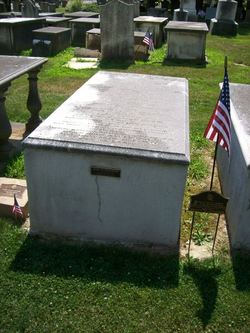While there in the Presidents section of the cemetery I noticed the resting site of the Rev. John Witherspoon. Witherspoon was the sixth president of Princeton and a signer of the Declaration of Independence. I must confess, I wasn't as familiar with Witherspoon as I was with Edwards, Warfield and Hodge. Several days later I arrived home, and decided to remedy my oversight. It was then that I began to research the life of this distinguished American clergyman. I thought it would be proper and appropriate to share some insights about his life on Independence Day. I hope that this provokes you to pause and think about the Christian heritage that all Americans share and hopefully enjoy!
John Witherspoon was born in Scotland in 1723. He was the son of a Presbyterian minister by the name of James Witherspoon. His mother was a descendant of the sixteenth century Scottish reformer John Knox. His mother taught him to read from the Bible by age four. Witherspoon entered Edinburgh University at the age of thirteen and graduated in three years with a Masters of Arts degree. After four more years of preparatory work he entered the ministry and accepted the pastorate at the Presbyterian church at Beith, Scotland. He spent eight years in Beith and then spent another eleven years as pastor of Laigh Kirk in Paisley, Scotland which seated 1,300 people. During his ministry, Witherspoon was a proud Calvinistic preacher who emphasized salvation by grace alone through faith alone. His sermons clearly reveal his zeal for the true gospel of the Lord Jesus Christ. He attracted several opponents because of his unwavering condemnation of sin.
In 1768 Witherspoon left Scotland to become the sixth president of the College of New Jersey (Princeton University). He served the university well as president from 1768 to 1794. One writer has described John Witherspoon as, "the man who shaped the men who shaped America." This is obvious considering his twenty-six year tenure as president yielded 478 graduates from the prestigious College of New Jersey. Among those 114 became ministers; 13 became state governors; 3 became U.S. Supreme Court judges; 20 became U.S. State Senators; 33 became U.S. Congressmen, Aaron Burr Jr. became Vice President; and James Madison became President. Witherspoon was a strong advocate for liberty and independence, as president of Princeton he encouraged and emphasized this sentiment. His deep rooted conviction earned him a seat in the Continental Congress, serving as a congressional delegate from New Jersey from 1776-1782. During his time in the Continental Congress he wore his ecclesiastical garments to remind the other men of the importance role that God must play in the formation of this new country. He also took a lead role in the adoption of the Articles of Confederation. He is probably best known as one of the original signers of the Declaration of Independence.
Witherspoon left a legacy behind of patriotism and piety. He was a gospel preacher who believed in the depravity of man and the sovereignty of God. John Witherspoon was somewhat of a rarity in his day; how much more in our day? His friend and colleague John Adams described him as, "a true son of Liberty" but foremost he was a son of the Cross! Would to God that we had men in government today with this kind of conviction!
 |
| John Witherspoon |
